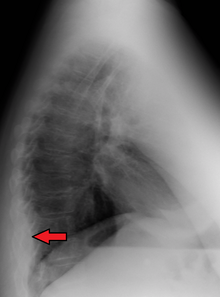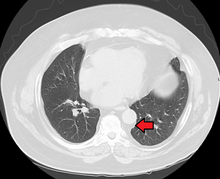Lipomatosis is believed to be an autosomal dominant condition in which multiple lipomas are present on the body. Many discrete, encapsulated lipomas form on the trunk and extremities, with relatively few on the head and shoulders.[1] In 1993, a genetic polymorphism within lipomas was localized to chromosome 12q15, where the HMGIC gene encodes the high-mobility-group protein isoform I-C.[2] This is one of the most commonly found mutations in solitary lipomatous tumors but lipomas often have multiple mutations. Reciprocal translocations involving chromosomes 12q13 and 12q14 have also been observed within.[3][4][5]
| Lipomatosis | |
|---|---|
 | |
| Mediastinal lipomatosis | |
| Specialty | Endocrinology |

Although this condition is benign, it can sometimes be very painful depending on location of the lipomas. Some patients who are concerned with cosmetics seek removal of individual lipomas. Removal can include simple excision, endoscopic removal, or liposuction.[1]
Other entities which are accompanied by multiple lipomas include Proteus syndrome, Cowden syndrome and related disorders due to PTEN gene mutations, benign symmetric lipomatosis (Madelung disease), Dercum's Disease, familial lipodystrophy, hibernomas, epidural steroid injections with epidural lipomatosis,[6] and familial angiolipomatosis.
Etymology
edit"fatty tumor" (plural lipomata), 1830, medical Latin, from Greek lipos "fat" (n.), from PIE root *leip- "to stick, adhere," also used to form words for "fat," + -oma.[citation needed]
word-forming element expressing state or condition, in medical terminology denoting "a state of disease," from Latin -osis and directly from Greek -osis, formed from the aorist of verbs ending in -o. It corresponds to Latin -atio.[citation needed]
See also
edit- Pelvic lipomatosis — A rare disease most often seen in older obese black men with hypertension.
- Virchow's metamorphosis — lipomatosis in the heart and salivary glands.
- Dercums — A rare condition characterized by generalized obesity and painful fatty tumors in the adipose tissue.
References
edit- ^ a b Toy, Brian R. (May 1, 2003). "Familial multiple lipomatosis". Dermatology Online Journal. 9 (4) – via escholarship.org.
- ^ Schoenmakers, EF; Wanschura, S; Mols, R; Bullerdiek, J; Van Den Berghe, H; Van De Ven, WJ (1995). "Recurrent rearrangements in the high mobility group protein gene, HMGI-C, in benign mesenchymal tumours". Nature Genetics. 10 (4): 436–44. doi:10.1038/ng0895-436. PMID 7670494.
- ^ Weiss, SW (1996). "Lipomatous tumors". Monographs in Pathology. 38: 207–39. PMID 8744279.
- ^ Gologorsky, Y; Gologorsky, D; Yarygina, AS; Surti, U; Zirwas, MJ (2007). "Familial multiple lipomatosis: Report of a new family". Cutis; Cutaneous Medicine for the Practitioner. 79 (3): 227–32. PMID 17674589.
- ^ Online Mendelian Inheritance in Man (OMIM): Lipomatosis, Familial Multiple Lipomatosis, FML - 151900
- ^ Jaimes R, Rocco AG (2014). "Multiple epidural steroid injections and body mass index linked with occurrence of epidural lipomatosis: a case series". BMC Anesthesiol. 14: 70. doi:10.1186/1471-2253-14-70. PMC 4145583. PMID 25183952.